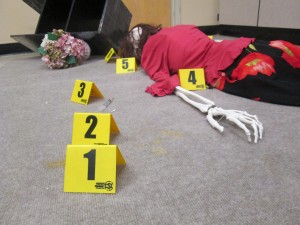
When the time came for students’ dissection days in high school, it usually consisted of frogs, cow eyes, maybe the occasional fetal pig. For most students it certainly did not consist of performing a triple bypass surgery on a working heart that they constructed. But Project Lead the Way’s (PLTW) newest addition to the science department, Biomedical Research, will expect students to do just that.
Throughout the class, students will learn to write autopsy reports, and use many forensic science elements such as DNA fingerprinting and crime scene analysis in their work. Students will also be working with medical care, both prevention and treatment, for conditions like diabetes and heart disease. Expected coursework in the health subject areas ranges as far from taking blood pressure to performing and reading electrocardiography (EKG) tests to surgery and dissection.
Although new to Timber Creek’s PLTW offerings, the course has been implemented in schools across the country. The course was established this year by forensics instructor Anna Stevens, who spent her summer training for the program and became the first Orange County instructor to do so.
Students understood from the first day of class that there were high expectations of them. One student, senior Robbie Dixon, noted, “The way she [Stevens] teaches and the rigor of the course prepares you for college.”
All the work is not without reward, though, as senior Mackenzie Betteridge pointed out, “It’s good that we’re focusing on careers, the world no longer specializes for future careers.” The class consists almost completely of labs, providing a hands-on and immersive environment where students will learn real-life skills directly applicable to many aspects of the medical field. “The class makes you feel like a CSI agent,” added Dixon.
Outside of medical practice, skills like writing, critical thinking, and independence will be crucial to succeeding in the class. Lab journals will be expected to be written at research level, a skill not covered in many high school courses.
Stevens noted that, outside of academics, the important focus for the class will be to move past curriculums and exam grades. “The best thing I want my students to learn is to be independent thinkers,” said Stevens.
The course also provides an opportunity for college credit. Students who begin the program as underclassmen and participate for three years have the chance to receive up to five credits to the University of Florida, and to be certified as an Assistant Lab Technician.
With time, Stevens plans to emphasize innovation and independent research by students. New opportunities have been brought to the surface with the course and will continue in years to come.
Stevens added, “I’m just proud to be the person who is trusted to do this.”